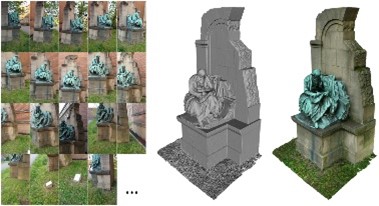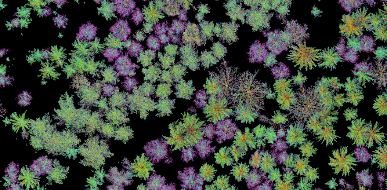EduServ22 (2024)
EuroSDR Educational Service (EduServ) annually offers four two-week e-learning courses in the field of GeoInformation (GI). It is designed for knowledge transfer from the research to the production domain. Thus, it is mainly focused on participants from NMCAs and industry, but PhD students and researchers also find the courses interesting as they always reflect the latest developments in GI.
The 22nd series of e-learning courses from EuroSDR will begin with a pre-course seminar hosted by the KU Leuven, Public Governance Institute, Leuven, Belgium, from March 4-5, 2024. During the seminar, background material of four e-learning courses will be presented by the tutors; participants will meet the tutors and fellow participants, get familiar with the software used during training, and the learning platform – Moodle will be demonstrated.
The four two-week e-learning courses are scheduled from March to June 2024. They can be followed over the Internet from any location, thereby allowing participants to update their knowledge with minimum disruption. Each course requires about thirty hours of online study.
You can download the flyer here.
 Remote sensing and change detection with Sentinel time series data (pdf)
Remote sensing and change detection with Sentinel time series data (pdf)
Tutors: Krištof Oštir, Bujar Fetai, Matej Račič (University of Ljubljana, Slovenia)
Copernicus, the European Union's earth observation programme, is served by a set of dedicated satellites (the Sentinel families) and contributing missions. Since the launch of Sentinel-1A in 2014, the European Union has set in motion a process to place a constellation of almost 20 more satellites in orbit before 2030. The course covers several aspects of processing dense time series data provided by the Sentinel satellites. The focus will be on high-resolution radar (Sentinel-1) and optical (Sentinel-2) data. The first step is to get data, both by classic download via Copernicus Open Access Hub and via Sentinel Hub. The basic processing is done with the open-source programme SNAP and the individual Sentinel Toolboxes. Afterwards, participants will learn how to process time series using Jupyter Notebooks and the Sentinel Hub Statistical API. They query the data, get and store time series as images and data frames (tables), and perform simple machine learning classification.
Dates: March 11-22, 2024
 Sustainable business models for open geospatial data (pdf)
Sustainable business models for open geospatial data (pdf)
Tutors: Joep Crompvoets (KU Leuven, Belgium), Frédéric Cantat (Institut national de l’information géographique et forestière – IGN, France
In the EU Open Data directive, geospatial and earth observation data are labelled as High Value. As National Mapping and Cadastre Agencies (NMCAs) in Europe are key providers of these types of data and as there is no such thing as a free lunch, NMCAs are enforced to provide geospatial for free but at a cost for themselves. The course on sustainable business models for open geospatial data will identify and analyse relevant business models that provide open (geospatial) data in a sustainable way. It is the intention that course participants build a sustainable open (geospatial/earth observation) data business model for their organisation or an imaginary one.
Dates: April 8-19, 2024
 From traditional to AI-based 3D scene capture and modelling pdf
From traditional to AI-based 3D scene capture and modelling pdf
Tutors: Michael Weinmann (Delft University of Technology), Dennis Haitz and Martin Weinmann (Karlsruhe Institute of Technology
Deep Learning has led to significant breakthroughs in various fields. The advent of implicit, neural-network-based scene representations such as Neural Radiance Fields (NeRFs) marks a significant leap in photogrammetric computer vision and novel view synthesis as well as respective applications in robotics, urban mapping, autonomous navigation, virtual/augmented reality, etc. Employing neural networks to efficiently encode high-resolution scene information has been demonstrated to capture precise 3D models while additionally being more compact than scene representations in terms of point clouds or voxel block models. Through a blend of theoretical insights, visual illustrations and practical exercises, this course will delve into core concepts, implementation strategies, and advanced applications of traditional and neural-network-based 3D scene capture and visualisation, providing you with the skills and knowledge to reflect on the strengths, innovation potential and limitations of current approaches.
Dates: May 6-17, 2024
 Point cloud processing with laser scanning pdf
Point cloud processing with laser scanning pdf
Tutors: Juha Hyyppä, Joseph Taher, Matti Lehtomäki (Finnish Geospatial Research Institute, Finland)
The development of point cloud generation optoelectronics has been fast during the last three decades. The first Airborne Laser Scanners (ALS) were built in the early 1990s by Optech Teledyne and Swedish and German militaries, followed by various Mobile Laser Scanners (MLS) in the early 2000s. Autonomous cars today use similar mobile lidar technology for autonomous perception. Previously, Google Tango and, today, iPad Pro include a laser scanner allowing crowdsourced applications. Today, there are also hand-held, backpack and drone systems, including lidars. Terrestrial laser scanning has become a standard tool for providing 3D data of the surrounding environment in non-built and built environments. This course will provide an understanding of how such point clouds could be processed into informatics. Introduction is given to laser scanning physics, general point cloud processing techniques, and then more focus is given to AI, namely machine-learning and deep-learning approaches in point cloud processing. Several applications are covered. Many examples come from forestry, where laser scanning has revolutionised traditional work.
Dates: June 3-14, 2024
Fees
€400 for pre-course seminar + 1 or 2 courses
€500 for pre-course seminar + 3 or 4 courses
€100 for pre-course seminar only
Scholarships
Five scholarships will be available to cover the course fee fully. The scholarships are intended for Ph.D./Master students and other applicants with no or very limited financial support from their university or public institution. Successful completion of at least two courses is expected from successful applicants.
In order to proceed with the application:
- Register to EduServ.
- Fill in the application form that includes a motivation letter and information about professional experience. It is recommended to support the application with a reference letter. Both documents shall be submitted to EuroSDR@mu.ie not later than February 9, 2024.
Applicants will be informed about the acceptance/rejection of their application by February 16, 2024. Successful applicants from previous years will be automatically excluded from the evaluation.
Registration
You can register here until February 16, 2024
Preliminary programme of the pre-course seminar
March 4, 2024 (time zone: CET)
9:30-10:00 | Registration |
10:00-10:15 | Welcome address, Short introduction to the courses Conor Cahalane, EuroSDR Secretary-General |
10:15-10:30 | Presentation of the Moodle Learning Management System Anka Lisec, EuroSDR Commission 5 Chair |
10:30-13:00* | Introduction to the course "Sustainable business models for Open geospatial data" Joep Crompvoets (KU Leuven, Belgium), Frédéric Cantat (IGN, France) |
13:00-14:30 | Lunch |
14:30-17:00* | Introduction to the course "Remote sensing and change detection with Sentinel time series data" Krištof Oštir, Bujar Fetai, Matej Račič Ana Buhvald Potočnik (University of Ljubljana, Slovenia) |
19:00- | Dinner |
March 5, 2024 (time zone: CET)
10:00-10:15 | Questions and answers from day 1 |
10:15-12:45* | Introduction to the course "From traditional to AI-based 3D scene capture and modelling” Michael Weinmann (Delft University of Technology), Dennis Haitz and Martin Weinmann (Karlsruhe Institute of Technology) |
12:45-14:15 | Lunch |
14:15-16:45* | Introduction to the course "Point cloud processing with laser scanning" Juha Hyyppä, Joseph Taher, Matti Lehtomäki (Finnish Geospatial Research Institute, Finland) |
16:45-17:00 | Questions and answers from day 2, Closing the seminar |
* Each session includes a coffee break
For more information, please contact Ms Neasa Hogan at EuroSDR@mu.ie
FAQ
Registration
· I haven't received a confirmation email yet. Did something go wrong?
No. An official confirmation email will be sent to you within 10 working days. If you haven't received an email, please contact the secretariat at EuroSDR@mu.ie.
· I would like to enroll to the e-learning course(s), but I am not able to attend the pre-course seminar. Is that a problem?
No. It is not obligatory to attend the pre-course seminar. Please note that the fee for attending the pre-course seminar is always included in the total price.
Fees & payment methods
· What does the course fee include?
The course fee includes all course materials, two-weeks of e-learning (incl. tutor support), participation at a two-day seminar, lunch on both days and a joint dinner on Monday evening. Please note that the course fee does not include accommodation and travel costs.
· Can I pay by credit card?
Unfortunately, we are unable to accept payment by credit card. However, payments can be made by bank transfer or by invoice. Please ALWAYS include your name and reference EduServ on any bank transfers.
· Is it possible to request an invoice?
Yes. Invoices will be issued as a matter of course. If you would like to receive an invoice immediately, please contact the secretariat at EuroSDR@mu.ie. Please note that EuroSDR does not have a VAT number.
Scholarships
· Who can apply for a scholarship?
The scholarships are intended to Ph.D./Master students and other applicants with no or very limited financial support from their university or public institution. You can only apply for a scholarship if you take an active part in all four EduServ courses and a minimum of two courses are successfully completed). Please note that successful applicants from previous years will be automatically excluded from the evaluation.
Further information on the scholarship application will be provided by email in the coming weeks.
E-learning platform
· When will I receive the login details of Moodle?
You will receive an email with instructions to access Moodle a couple of days prior to the pre-course seminar/the e-learning course you registered for. If you haven't received any email by then, please contact the secretariat at EuroSDR@mu.ie.
· How do I log in on Moodle?
Once you have created an account on Moodle (you will receive the instructions by email), you should be able to log in with the username (your email address) and password your entered during registration. If you need any technical assistance, please contact matej.racic@fgg.uni-lj.si or anka.lisec@fgg.uni-lj.si. Important: you have to create a new account on Moodle first even though you already participated in EduServ in the past (before 2022) as the e-learning platform is now hosted by the University of Ljubljana.
· How long and when will I have access to the study materials?
Once the course has started, you will have access to the study materials 24/7 for four weeks (thus the course materials are accessible until two weeks after the course has ended), to allow participants to follow the course with minimum disruption.
Certificates
· Will I receive a certificate?
Yes, you will receive a digital certificate of completion after successfully completing the e-learning course(s). This certificate will be sent to you by email latest at the beginning of July. If you haven't received your certificate by then, please contact the secretariat at EuroSDR@mu.ie.
In case you did not pass the course(s) and actively participated in the course, it is possible to obtain a certificate of attendance. You can request this certificate by sending an email to EuroSDR@mu.ie.
For more information, please contact Ms Neasa Hogan at EuroSDR@mu.ie.
